Research Day brings together campuses, ideas
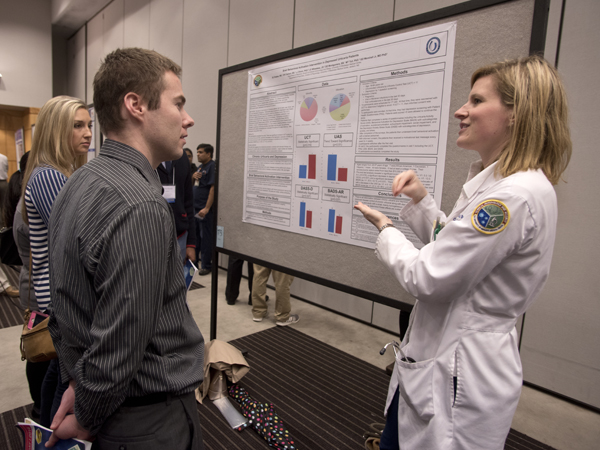
If knowledge is food for the brain, then the 2nd annual UM/UMMC Research Day was a veritable feast.
More than 120 presenters provided free samples of their work on Thursday, March 3, in the Norman C. Nelson Student Union.
Hosted at the University of Mississippi in Oxford last year, Research Day is meant to facilitate communication and collaboration between the campuses through a series of lectures and posters.
"Every good scientific meeting should be inspirational and informational," said Dr. Richard Summers, associate vice chancellor for research at UMMC. "The purpose of today is to allow each other to understand what we each do and to build synergy between our campuses."
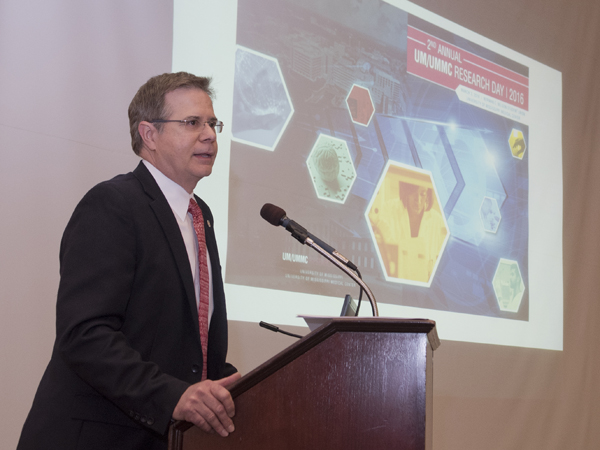
Synergy means that combined efforts are greater than the sum of their parts, said Dr. Jeffrey Vitter, chancellor of the University of Mississippi during his featured keynote address.
"We are here to build new collaborations, new friendships and new ideas," Vitter said.
"One of the end goals of research is to translate our work in order to save lives and enhance quality of life."
Dr. Alan Jones, professor and chair of emergency medicine, presented a keynote speech on his lifesaving work on carnitine supplementation for sepsis patients. He runs the first-known NIH-funded clinical trial that uses an adaptive research model.
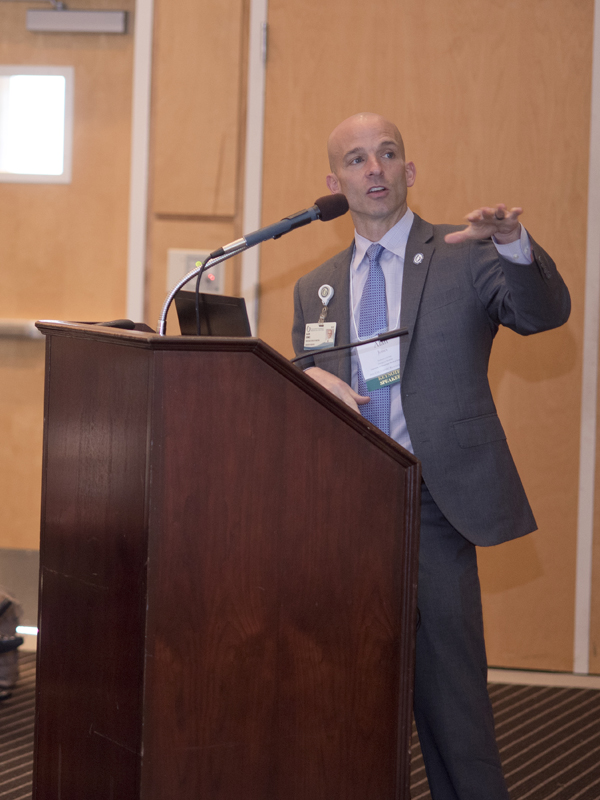
In adaptive research, Jones and his team reassign treatment groups based on observations such as improvements after treatment or side effects. For example, if a treatment doesn't work for a patient, they stop receiving the treatment.
"This approach gives benefits to our patients, maintains an ethical balance and is efficient," Jones said.
Research such as Jones’ contributes to the "cycle of innovation" Vitter describes as important to attracting the best and brightest faculty and students to Mississippi.
Dr. Bradley Walters, assistant professor of neurobiology and anatomical sciences at UMMC, called Research Day a form of "science speed dating." He's not far off; presenters had three minutes to describe their work to the room and their ideal research partner.
Dr. Erik Hom, assistant professor of biology at UM, extended the dating analogy when he described his work as "matchmaking and planned communities" for microbes.
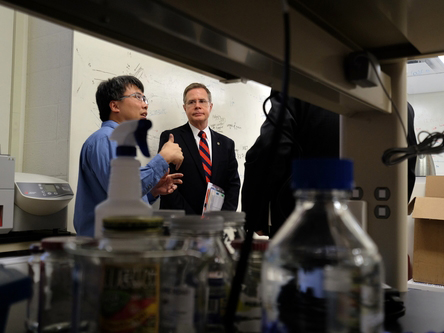
"We study how microbes interact and learn the rules of their game," Hom said. "If we understand the rules, then we should be able to build communities," which he says can be used to study the human microbiome, generate biofuels or even discover novel natural products of fungal/algal symbiosis.
Likewise, the University of Mississippi campuses need a symbiosis of their own to continue breaking new ground.
"We need to bring down silos and come together to collaborate," Vitter said. "The problems of energy, poverty, war and cancer cannot be solved by individual disciplines, but will require many disciplines to accomplish these goals."
This includes fields outside of the Medical Center's biomedical science expertise. UM brought researchers from departments including anthropology, journalism, recreation, geology, social work and physics.
Dr. Katherine Dooley, UM assistant professor of physics and astronomy and keynote speaker, knows about working with broad disciplines and large research teams.
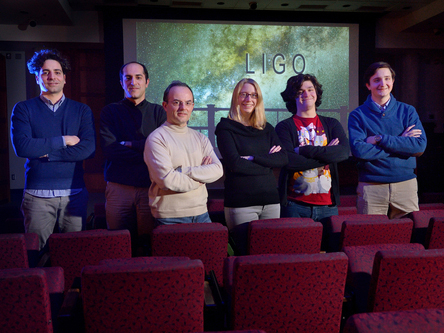
As a Laser Interferometer Gravitational-Wave Observatory (LIGO) team member, she had more than 900 collaborators ranging from theorists to engineers. Big teams are needed for big discoveries: they observed gravitational waves made by two colliding black holes, each more than 30 times larger than the sun, more than a billion miles from Earth.
The discovery, which confirmed Albert Einstein's hypothesis from 100 years ago, means that we can observe the universe through not only light, but through sound.
"We have opened our ears to the universe and there are more discoveries to be made," Dooley said.
In his closing remarks, Summers said he learned about new and upcoming intercampus collaborations that he wasn't aware of previously.
One collaboration is a grant recently submitted by Dr. Lique Coolen, professor of physiology and biophysics at UMMC; Drs. Chris McCurdy and Stephen Cutler, professors of medicinal chemistry and pharmacology at UM; and two faculty members at Louisiana State University. If awarded, the grant would allow the team to study learning and memory in juveniles in an integrated, cross-discipline approach.
"We would work to develop cognitive enhancers from natural products," Coolen said, "and eventually this would aid in the development of new learning, educational and workforce strategies."
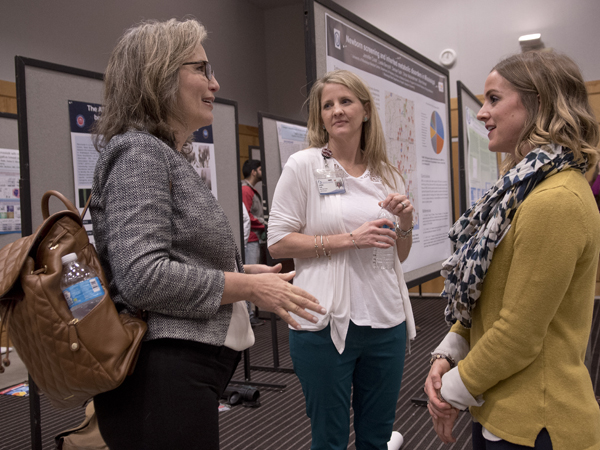
The Research Day poster session was an opportunity for presenters to ask questions and interact with each other, building potential for future collaborations.
Dr. Claire Brabec Rosenblatt, fellow in medicine at UMMC, presented her poster on using behavioral intervention to prevent rashes associated with depression.
"When we treat patients clinically, we need to understand that emotional and spiritual aspects need to be addressed to help with improvement in their conditions," she said.
Dr. Paul Loprinzi, assistant professor of health, exercise science and recreation management at UM, brought his graduate students to Research Day "to showcase our current and future research and to better connect with other clinicians and researchers," he said.
"Rosenblatt's project was intriguing to us as it aligned nicely with our current and future projects that evaluate the effects of physical activity on various health outcomes, including depression, as well as identifying models to better promote physical activity," Loprinzi said.
Listening to people's ideas in venues like Research Day is part of Vitter's 100-day Flagship Forum tour, during which he intends to learn about all aspects of the University of Mississippi.
"People don't care how much you know until they know how much you care," Vitter said, quoting Theodore Roosevelt. The Flagship Forum speaks to one of Vitter's core values: direct engagement with the entire campus community.
And engagement between University of Mississippi scientists can start with three-minute speed dating.


